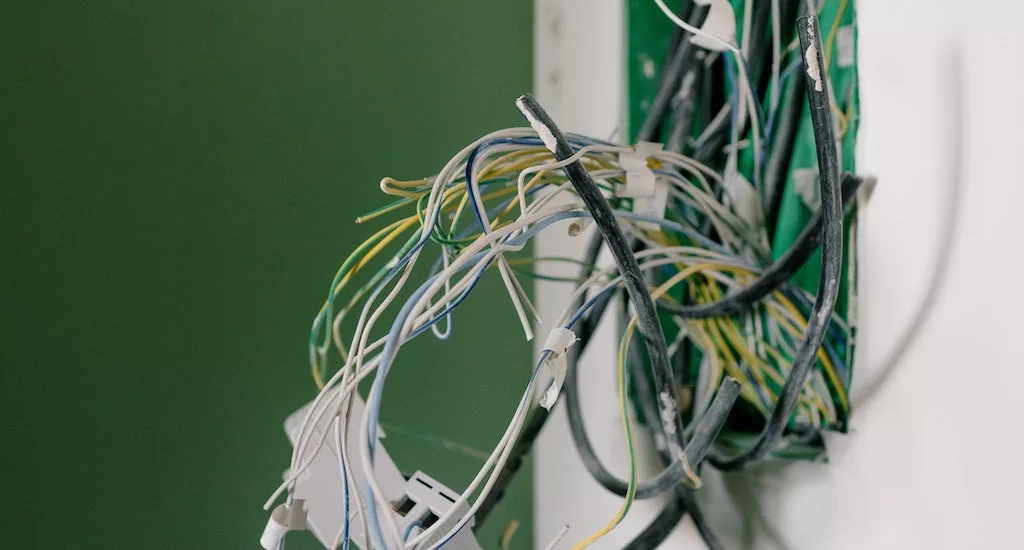It is vital that the wiring is maintained properly. Broken or outdated wiring is a serious hazard and must be replaced to avoid the risk of a fire break-out with all its harmful consequences to your family and your home. Wiring also needs to be installed by a licensed and bonded electrician who has a proven track record of success.
If you want to enjoy your home and ensure that it is safe and sound then your electrical sources need to be reliable. Many homes are damaged or burned to the ground due to electrical fires that could have easily been prevented.
In sum, outdated electrical components, subpar wire maintenance and/or installations, and broken or frayed wires can lead to electrical shock and fires that can cause injury or death. Here, our focus will be on how you can handle issues involving faulty wiring in your home.
Typical Symptoms of Defective House Wiring
1. A persistent burning smell. If you notice a strange or unpleasant odor emanating from your outlets then you should turn them off and remove any devices that are connected to them.
Burning odors are usually caused by extensive fire damage. It should quickly be repaired by a skilled electrician to avoid further damage to your home.
You can also call your local fire department so that they can further investigate the matter and discover the root cause of the fire damage.
2. Lights that flicker or dim. Another major electrical problem to be on the lookout for is lights that flicker or dim on a regular basis. Defective wiring or an overloaded circuit may cause your lights to fade or flicker over time.
3. Unexpected noise. Faulty or older wiring that has seen better days may cause a buzzing noise to come from your outlets or lights. It is also possible for light fixtures to produce electric noise as well.
4. Outlet discoloration or scorch marks. If the wiring in your home has been extensively damaged then it may actually begin to leak heat: When this happens your outlets may develop scorch marks or may become discolored over time.
5. Keep track of any tripped circuit breakers. Electrical wiring issues can also lead to circuit breaker trips. If your circuit breakers trip a few times a month then you should call an electrician in order to take a look at your home’s wiring.
What to Do if Your Wiring is Faulty
If you are not sure about the quality of your wiring then you should consult a well-trained electrician in your municipality. They have the skills, know-how, and tools needed to inspect your home’s wiring from top to bottom.
An amateur should never try to take such matters into their own hands. If you do not have an extensive background in wiring then trying to fix your wiring yourself can prove fatal. In addition to serious safety concerns, you may also run into problems concerning industry standards and building code violations.
A qualified electrician will adhere to all of the aforementioned guidelines and protocols while they are working with your electrical panels and wiring so that you can have peace of mind.
Tips for Maintaining the Safety of the Electrical System
First, you should examine how old your electrical system is. It may not actually be to code if you live in an older home.
You should check your electrical panel if you have recently moved into a new home and are not sure when it was last inspected. Look for a signature or initials that show the last inspection time and date.
You should also make sure that your circuits are not overloaded. Each of your circuits is designed to handle a certain load capacity. If you exceed this limit then circuit breakers will need to be tripped. Overloaded circuits will eventually burn and may start a fire.
Plus, don’t rely on extension cords as a long-term solution. While they are convenient they should not be used as a permanent solution in order to power your home. Instead, call an electrician and ask them to install additional outlets.
Moreover, you should avoid using indoor-rated cords outdoors, and vice versa, in order to avoid potential safety issues down the line.
Check for discoloration in your outlets and switches whenever possible. Wire overheating will often cause switches and outlets to become discolored.
You should also be on the lookout for sparks and if you notice a burning smell coming from your switches or outlets, then you should call an electrician asap. A strange sizzling or buzzing sound may also require the skills of an electrician.
It is also paramount that you unplug your appliances when they are not in use. Appliances that have been damaged should not be used either. Of course, they can be repaired but in some cases, badly damaged appliances may need to be replaced.
While it may be tempting to hang onto defective appliances in order to save money, they can electrocute you or start fires that can prove disastrous or even fatal.
You may also want to consider going over your home’s wiring with your electrician. They may help you identify safety hazards that you were not aware of, and they may provide you with tips that can help protect your home and even save you money on your utility bill every month.
Better Safe…
By being aware of the telltale signs of faulty wiring you will be able to quickly identify and repair any electrical issues in your home before they become serious. Having an electrician inspect your home will ensure that all electrical and fire hazards are eliminated.
They will also test your carbon monoxide and smoke detectors to ensure that they are still in good working order.
In sum, if you are worried that your home might be at risk of faulty or obsolete wiring then you should play it safe and call a certified electrician in your area to check it out.


